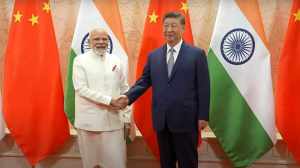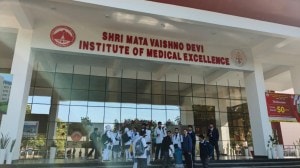Nitish146;s tight rope walk
He has no advantage of history to flaunt, unlike in many southern and western states, in the realm of growth, nor any developmental icons

On August 24 Nitish Kumar completed nine months as chief minister of Bihar. A day earlier, the HSBC Hongkong and Shanghai Banking Corporation inaugurated its 44th branch in Patna; two days later, the tenders for building the roads of Patna were opened. Contrary to initial apprehensions, of the eleven nationally reputed builders who had bought the tender forms, two companies, Tantia Group Construction Ltd and Consortium of DS Constructions and P038;M Infrastructure, actually submitted the tender, each with a deposit of
Rs 1.40 crore for a Rs 140 crore road building project. These two apparently unconnected events indicate the initial outcome of a sustained re-branding of Bihar.
Nitish Kumar is possibly the only public figure in recent times who is engaged in two onerous tasks 8212; one, the re-branding of the state through administrative and industrial planning and tax reform and, two, providing a slew of subaltern-friendly steps like reservations for the lower backwards in Panchayat elections, setting up a land reform commission, a commission on the common school system, a farmer8217;s commission, and giving a massive thrust to the Sarva Shiksha Abhiyan. Apart from working out the contours of the developmental policy, he is trying to create the necessary conditions for the emergence of public institutions that can sustain quality governance.
Institutions are being planned to provide higher education opportunities within the state, plug student migration. The Chanakya National Law University at Patna will not only provide the much needed integration with international legal epistemology but also produce graduates who will contribute to every level of governance. Gone are the days when industry or agriculture in India could flourish in a protected market, without the need for international legal literacy. The agenda for development in a peripheral economy like Bihar with scant literacy and a very limited market is a formidable one.
Nitish Kumar is essentially working out the nuts and bolts of a policy initiative that was electorally fine-tuned in the last assembly election. The victorious coalition was possibly the broadest social coalition, incorporating extreme social groups from the elite to the very subaltern.
He is functioning with several handicaps. He has no advantage of history, unlike in many southern and western states in the realm of growth, nor any developmental icons. He does not have a well-oiled party organisation, like the CPM in West Bengal, which can act as a social shock absorber or foot soldiers for implementing governmental programmes. The absence of a corporate sector and a development oriented civil society is another major constraint in re-branding the state. Thus the success of the developmental strategy here rests entirely on the bureaucracy which falls short on both capacity and commitment. However, these handicaps get partly compensated by a so far non-hostile central government. P. Chidambaram8217;s visit to Bihar, his first to a Hindi heartland state, was a political coup for Nitish Kumar. Even within the state, the NDA is functioning quite cohesively. Deputy Chief Minister Sushil Kumar Modi has played a decisive role in this cohesion. He is also co-architect of several tax reforms.
The task of rebuilding Bihar, however, needs not just cohesion within the NDA, but a broader consensus. Bihar has never pursued a cohesive and inclusive agenda of development. This was primarily due to the absence of a viable, forward-looking and inclusive state structure. Further, feudal patterns of appropriation came in the way of the formation of an authentic elite. The foundation laid in the fifties by the then ruling elite determined the subsequent trajectory of underdevelopment. In recent times, while society got increasingly democratised, the elite of the state gave up 8216;ownership8217;. The functioning of the state nosedived further.
Will Nitish Kumar restore the sense of ownership of the elite, without undermining democratisation? To what extent will the subaltern be part of the ruling coalition without allowing encroachment on their hard won space?
For Nitish Kumar these nine months have been a tight rope walk. Ultimately, his political and administrative capacity will be measured in terms of the implementation of his policy of 8216;growth8217; with 8216;justice8217; without abandoning the 8216;coalition of extremes8217;.
The writer is Member Secretary, Asian Development Research Institute ADRI, Patna
- 01
- 02
- 03
- 04
- 05































